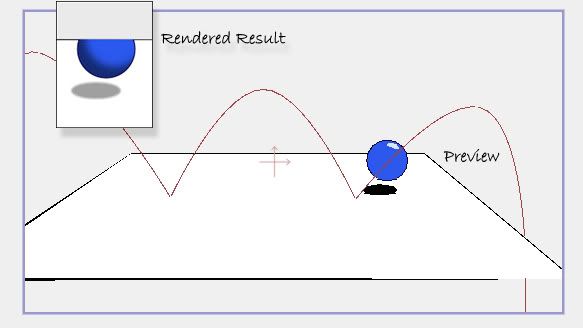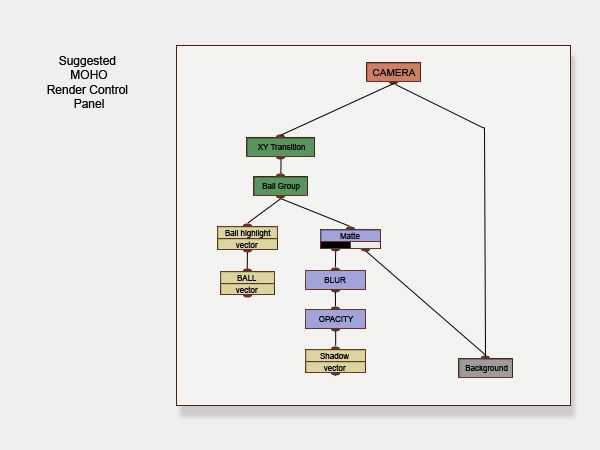There is the layout.

Problem one:
In the preview window, the ball is correctly matted/masked.
But when rendered, the output does not read the layer matte instructions in the same way as the preview/composite window.
The problem appears to be the renderer not the preview.
Problem two:
In the exercise, the ball is both in front of and behind the ground plane.
This means I have to turn the matting on/off ... and there is not way to do this on the timeline. This facility needs to be added in future vesrions of Moho.
The noho file is here: Bounce 3 test
Matte Problem Overview:
The Moho matting is not at present designed for extremely complex matting (By complex, I mean like a film called "Drums of Moto Hanto" completed for S4C (uk tv) where I was using up to 30 texture mattes per character (achieved using Animo 1.7)).
At the moment, there is simply no way I could do that project in Moho (yet) since it does not have the control of which mattes are applied in combination to multiple layers.
The matte problems including bug that need to be addressed are:
- Bug:
- You cannot matte a nested panning layer.
Suggestion: - You cannot turn layer matting on or off via the Timeline.
- On the timeline you cannot toggle between foreground and background matting. This is useful if you want to reverse a matte fast.
- Nested Mattes move with it the object - not good if its a BG matte, not a Chr matte.
One good technique is to keep the matte/layer rendering control separate from the folder/layer ordering. Softimage, Animo3 etc, use a "string"/linked method [see diagram below] - the camera is always at the top. You then link the layers. transformations, mattes, filters etc together via links ... the technique is extremely flexible and powerful:
Interestingly, it is highly suited to object-orientated programming (c++ etc) since you are instructing directly which object has to go through which code routine and in what order.
Here is a mock-up of the Bounce3 test.

This is a good design feature for inclusion in Moho 6. It might even be achievable with Lua script.
-----------------------------------------------------------------------------
For those who want to play with the problem, here is the moho file.
Bounce 3 test
Please note that I placed the Bouncing ball animation into several sub-folders - this is an Animo inherited practice where you build up the scene, action by action, each in a separate folder. The basic bounce action starts in folder 1, just bouncing ball on the spot. Folder 2 is added to look after the east-west pan. Folder 3 would look after any depth info. By keeping the different axis' separate, you can add/delete anything without upsetting other actions. For example, you can add a camera shake to an existing move without messing up the original camera move.
This technique was learned the hard way, under a director who didn't know what he wanted until he saw what he didn't like. IE, build in the flexibility because animation directors love to change thier minds ... my current director/producer changed voice talent half way though a series - we had to go back and re-lipsync all the films
Okay, that's all folks.
Comments appreciated.
Rhoel
